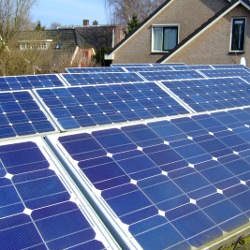Apr
7
Written by:
epcassessor
4/7/2011 9:09 AM

Feed In Tariffs for Renewable Energy Production – A Summary.
 For some time now, consumers have been incentivised to generate their own electricity (from turbines, PV or CHP) by being paid for any excess electricity they export into the National Grid. This is known as the feed-in tariff (FIT). The RHI Scheme aims to apply the same long-term tariff approach to heat generated from other renewable energy sources, such as biomass and ground source heat pumps.
For some time now, consumers have been incentivised to generate their own electricity (from turbines, PV or CHP) by being paid for any excess electricity they export into the National Grid. This is known as the feed-in tariff (FIT). The RHI Scheme aims to apply the same long-term tariff approach to heat generated from other renewable energy sources, such as biomass and ground source heat pumps.
Under the RHI Scheme, organisations using renewable heat will receive quarterly payments for 20 years from the date they enter the Scheme. In addition to support for new installations, organisations that have installed eligible renewable heat equipment since 15th July 2009 will also qualify for support under proposals in the RHI Scheme.
The proposed RHI Scheme will be introduced in two phases:
- INDUSTRIAL, BUSINESS AND PUBLIC SECTOR
Long-term tariff support will be targeted at the big heat users; currently contributing 38% of the UK’s carbon emissions. There will also be some support, around £15million, for households through the Renewable Heat Premium Payment.
- HOUSEHOLDS
Long-term tariff support similar to that offered to the non-domestic sector in the first phase. This will be timed to align with the Green Deal which is intended to be introduced in October 2012.
Long Term Approach to Energy Efficiency of Buildings
Whilst it is to be hoped that the RHI will give industry the confidence to develop a long-term stable framework: Something which all players in the energy efficiency industry have been asking for, it sounds too good to be true; Andrew explores whether this is the case.
Like the FIT, there is the question of unfairness to those who have already installed renewable energy technology prior to the start of the programme and will therefore miss out. To counter this, the Government states that those who have installed systems since 15 July 2009 will be able to claim RHI payments as long as the Scheme's (as yet unpublished) conditions are met.
The proposed incentive has also been criticised as encouraging waste. It could be argued that if people are paid per unit of renewable energy generated, even if they use it themselves, they will be encouraged to ‘burn’ more and let the heat go to waste; they get paid anyway. For this reason, at least at the domestic and small business level, the proposal is that the RHI Scheme will be a payment calculated on a “deemed” amount, rather than the actual amount of fuel used.
Reduce Energy Wastage of Property by Having a ‘Deemed’ Amount.
 The ‘deemed’ amount of energy for a property will be done using SAP2009 (Standard Assessment procedure) or SBEM (Simplified Building Energy Model) software. This calculates (among other things) the annual energy required for space heating and water heating for a property based on standard occupancy and assuming a reasonable level of insulation. Based on this calculation the RHI Scheme will pay a fixed annual sum, this means the recipient will know in advance what their payments will be. This approach will ensure that the funds are fairly distributed, on the basis of the energy the property needs, not what the occupier uses.
The ‘deemed’ amount of energy for a property will be done using SAP2009 (Standard Assessment procedure) or SBEM (Simplified Building Energy Model) software. This calculates (among other things) the annual energy required for space heating and water heating for a property based on standard occupancy and assuming a reasonable level of insulation. Based on this calculation the RHI Scheme will pay a fixed annual sum, this means the recipient will know in advance what their payments will be. This approach will ensure that the funds are fairly distributed, on the basis of the energy the property needs, not what the occupier uses.
The energy report created will also be able to highlight low cost ways to minimise the energy consumption of the property by upgrading the building fabric for which other grants are currently (and hopefully will continue to be) available. Undertaking this work would be worthwhile as the RHI Scheme payments stay fixed even if energy usage in the property falls.
Andrew’s interest really kicks in here. “As an initiative, this is a world first! It has huge benefits for everyone, consumers, the energy industry, manufacturers and installers alike. It’s beautifully simple and just common sense – I really hope that red tape doesn’t prevent this happening fast and it doesn’t simply turn out to be a good idea wasted in hype.”
Synergy Property Services your expert Energy Assessor.
 Synergy Property Services Ltd. will give you straight forward advice on how you could benefit from the proposed new Energy Legislation and can explore with you the opportunity to reduce your overall energy costs, please contact Andrew Morphet of Synergy Property Services Ltd direct on 0800 458 4127.
Synergy Property Services Ltd. will give you straight forward advice on how you could benefit from the proposed new Energy Legislation and can explore with you the opportunity to reduce your overall energy costs, please contact Andrew Morphet of Synergy Property Services Ltd direct on 0800 458 4127.
For a quote or with any other enquiry please email us or use our simple contact form. You can also sign up to the Synergy Property Services Newsletter to keep up to date with energy legislation and how it might affect you.
|
1 comment(s) so far...
Re: Renewable Heat Incentive (RHI) Scheme
Have to say Andrew that I think that the FIT scheme is one of the biggest cons introduced by any government and is ripping off the British taxpayer and energy user. To be paid approx. 40p/kWh to generate something which is then sold for approx. 10.5p/kWh is criminal. It would be much better to make it law so that all new build houses have photo voltaic panels installed or some other sort of heat source. The price of the technology would then reduce significantly and the technology improve at a faster rate making it cheaper and easier to install in older houses.
Just an opinion!!
By Ian Ball on
4/7/2011 2:22 PM
|
|
|